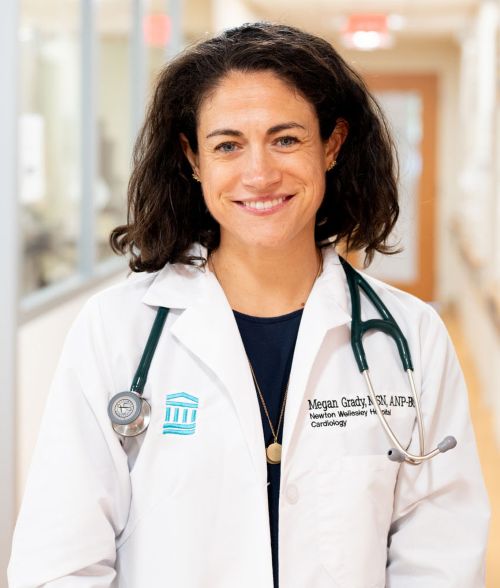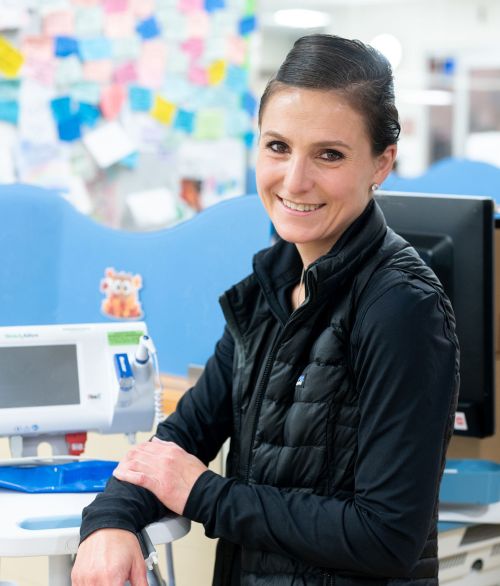Meet our Advanced Practice Providers
The expanding role of Advanced Practice Providers, or APPs for short, is reshaping healthcare. Explore the skills, passion, and collaborative spirit that they bring to our family of caregivers.
Five years ago, Amy Israelian, DNP, ANP-BC, arrived at Newton-Wellesley to take on a new role for our hospital community: Lead Advanced Practice Provider.
Looking back, “I don’t think many people at the time knew the terms APP or advanced practice provider,” recounts Amy, recently named Director of Advanced Practice. Among today’s hospital staff, “now it just rolls off of everybody’s tongues.”
Public understanding is still catching up.
At Newton-Wellesley, our 488 Advanced Practice Pro¬viders, or APPs for short, include physician assistants, nurse practitioners, certified nurse midwives, and certified registered nurse anesthetists.
Broadly speaking, APPs perform many of the tasks once associated with physicians. For example, they may conduct exams, order tests, diagnose illnesses, and write prescriptions. Nationally, studies show that they now manage about a quarter of all healthcare visits.
You’ll find APPs within many specialties, from Orthopedics to Cardiology to Endocrinology. In Amy’s case, besides her leadership role, she’s also a nurse practitioner within NWH’s Division of Plastic and Reconstructive Surgery.
“Everyone who receives care at this hospital is going to interact with an APP at some point,” she notes.
Among the nation’s fastest growing jobs
Nationally, demand for these roles continues to grow. According to projections from the Bureau of Labor Statistics, nurse practitioner is the fastest-growing occupation in the country, expected to grow 46 percent by 2031. At the same time, demand for physician assistants is expected to rise by 30 percent, and nurse midwives and nurse anesthetists are both expected to see strong job growth.
When Amy first took on her lead role, “APPs weren’t all necessarily practicing at the top of their licenses or doing what they were trained to do,” she reflects. Along with supporting APPs in their professional development, “we’ve done a lot of education with our physician and leadership colleagues about what we can do professionally.”
At Newton-Wellesley, she emphasizes how APPs work collaboratively with their physician colleagues and teams. She promotes a culture of working together and supporting each other—all for the benefit and comfort of their patients.
An integral part of the Cardiology team
Megan Grady, CNP, echoes Amy’s point on collaboration. She joined the Elfers Cardiovascular Center as a nurse practitioner a decade ago, practicing in the outpatient clinic together with its attending physicians.
“I have always loved getting to know my patients, hearing their stories and helping them to navigate their health journey,” she says. “And I love my team at NWH Cardiology.”
She had dreamed of being a nurse since completing a hospital internship in high school and began her career at Massachusetts General Hospital. Her path ultimately led her back to school for her MSN and then to Newton- Wellesley. She credits nursing for instilling a foundation of keeping the whole patient in mind.
Most of her day as an NP involves meeting with patients to diagnose, manage, and educate them about their cardiovascular health.

Megan Grady, CNP
“Over the last 10 years, the role of APPs has really blossomed into an integral part of the healthcare system,” Megan reflects. “Physicians increasingly rely on skilled, highly educated colleagues.”
At the same time, “the hospital has made an effort to unite everyone as one big team,” she explains. She credits Amy with bringing together APPs from across all departments and building connections.
Finding fulfillment as a psychiatric NP
The introduction of an APP Council a little over a year ago exemplifies the connections being forged across Newton-Wellesley. Its members meet monthly, with representation from each clinical area.
Now in her third year at NWH, Linden Spital, RN, MSN, CRNP, PMHNP-BC, represents Child and Adolescent Psychiatry on the council. In the past, she’d been accustomed to being the only psychiatric NP wherever she’s worked. Her council role has given her a new sense of being part of a larger whole.

Linden Spital, RN, MSN, CRNP, PMHNP-BC
Drawn to healthcare from her middle school days, Linden didn’t land on the idea of being a nurse practitioner until after college. Yet early on, she remembers how “I wanted to impact vulnerable populations.” A three-year MSN program in psychiatric mental health nursing proved the right choice and helped her to become well versed in treatment modalities.
While she’s worked with patients of all ages, she gravitated toward pediatric consult psychiatry.
At Newton-Wellesley, “I appreciate the vulnerability that patients and families bring,” she says. “I like meeting them where they’re at. That’s often in crisis.”
Working in her field, she often meets patients at moments in their lives where they feel fragile and emotionally unstable. “Short-term de-escalation fuels me,” she adds. She finds fulfillment in helping people in crisis to put things in perspective and figure out their next steps.
Being there for inpatients
When Kelly Conley, PA-C, MAPAS, joined Newton-Wellesley in 2022, it marked her very first job as a physician assistant.
Initially working as a patient care associate after college inspired her to pursue her master’s in physician assistant studies. A dozen rotations in inpatient and outpatient settings “gave me exposure to all different fields and specialties of medicine,” she says.
“It opens your eyes to the broad range of possibilities,” she reflects. She found that she loved the hospital environment most—and NWH offered a perfect balance.

Kelly Conley, PA-C, MAPAS
Kelly now works within the Hospitalist Department as part of a team of 20 full-time PAs. Working on inpatient units, they are responsible for implementing care plans, writing orders, and often admitting and discharging patients.
“I love it here!” she exclaims. “It’s very welcoming to new grads. I feel like I’m learning every day.”
Speaking of learning, she values how APP Grand Rounds provide continuing education on timely topics. She also helps to create her department’s educational sessions for its own PAs, working in partnership with one of the attending physicians.
Across the hospital, “there’s a great sense of community among APPs,” she adds. “We want everyone around us to be successful. It’s nice being in a place where you feel appreciated and supported.”
Providing the care that patients need
Advanced practice models originally took root in the realm of primary care, Amy explains. Looking back at the history of nurse practitioners and physician assistants, for example, they grew in part from a need for expanding access to care.
While she’s breaking ground in her lead APP role at NWH, it’s something she’s been doing her whole career. Since a stint in the Peace Corps in West Africa led her to decide on nursing over medical school, she’s been part of many firsts. She trained as part of the inaugural cohort for a new accelerated master’s program. After joining Mass General as a staff nurse in 2002, she went on to become one of the first nurse practitioners within inpatient general surgery and then the plastic surgery service’s very first NP.
Today at Newton-Wellesley, “if you now look at where we work, there’s probably not one medical or surgical specialty that doesn’t have an APP presence,” Amy notes.
On the administrative side, “I love being able to advocate for our APPs and mentoring and helping them develop professionally,” she says. At the same time, “I really love my patients, and I love the relationships that I build with them.”
Every day, together with her fellow APPs, “we’re making a meaningful impact in our patients’ lives.”